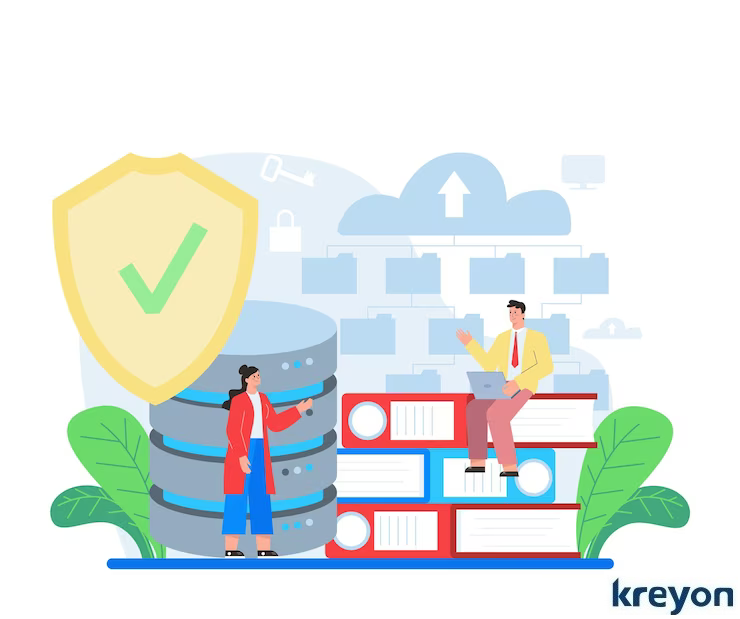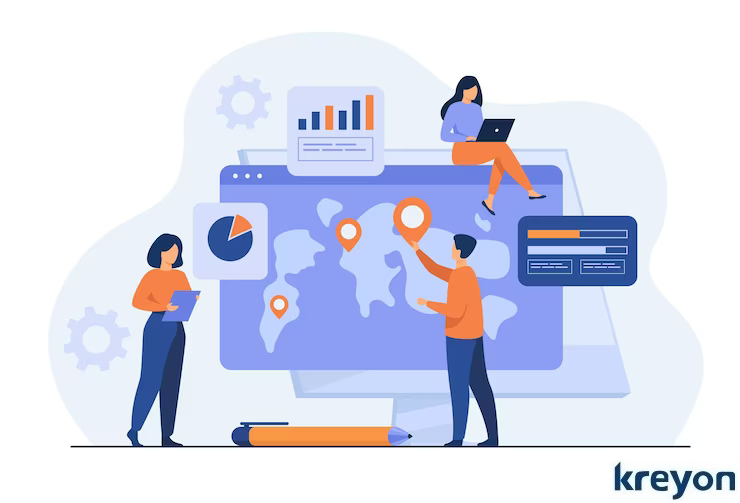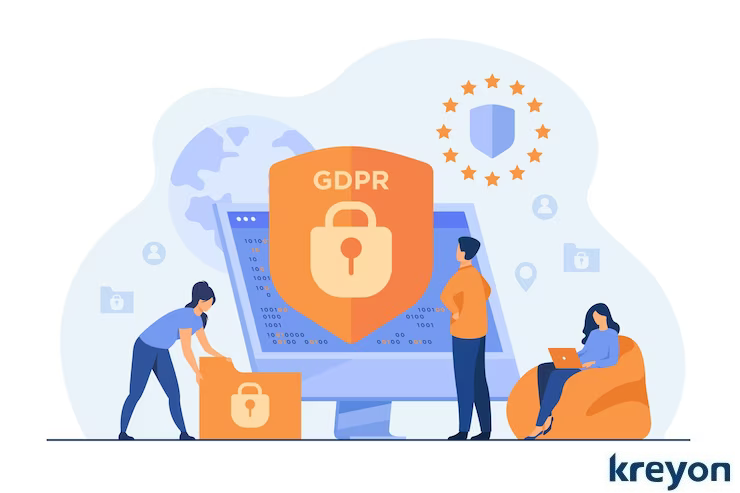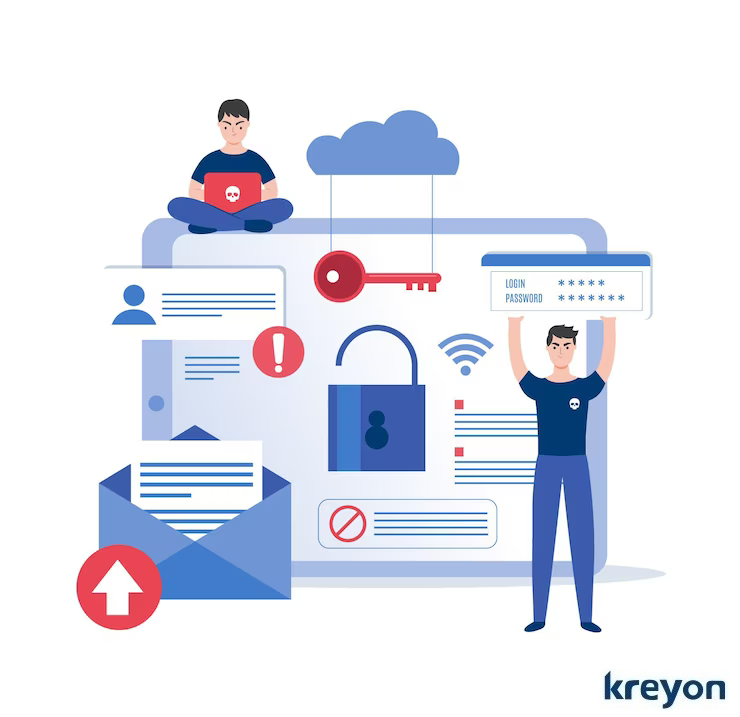Data Privacy in SaaS Products: How to Protect Your Business & Customer Data

Data privacy in SaaS products is a basic right of the customers’ today. The amount of personal data that businesses collect from their customers has increased exponentially over the last few years. From credit card numbers to full names, addresses, and phone numbers, business owners want to know that their customers’ data is secure at all times.
While most companies may be aware of the risks posed by data breaches and identity theft, not everyone stays vigilant when it comes to keeping customer information private. To stay compliant with regulations and ensure data privacy, you need to take certain steps to protect your business and customer data.
In this blog post we will explain how you can ensure the privacy of your business and customer data while also staying in compliance with the laws governing your industry.
Develop & Implement an Information Privacy Program
It’s no secret that the world is changing rapidly. With the rise of technology and the ubiquity of social media, businesses are constantly striving to keep up with the latest trends and developments. One of the most important developments in this environment is the explosion in cloud-based computing.
This trend has given rise to a new type of business – the SaaS (software as a service) company. SaaS companies offer their customers a wide range of services, including software, storage, and other technologies. But one of the biggest concerns for businesses using SaaS is data privacy.
The reality is that SaaS companies store a great deal of customer data on their servers. This data can include personal information like addresses, phone numbers, and email addresses. It also includes data about the customers’ use of the software services, their interactions with the company, and their interactions with other customers.
As a business owner, you need to have a clear understanding of data privacy laws in your state. You also need to have an information privacy program in place to protect the privacy of your customers’ data. This program should include procedures for collecting and protecting customer data, as well as for monitoring and managing customer data usage.
By implementing an information privacy program, you can help protect your company’s reputation and ensure that your customers’ data is protected in a safe and secure way.
Be Transparent About your Data Practices

When it comes to data privacy, it’s important to be transparent about your data practices. This way, your customers can understand what information you’re collecting and why. And, more importantly, they can make informed decisions about how they want to use the software you provide.
For example, if you’re a SaaS provider, it’s important to let your customers know how you’re using their data. Are you storing their data in the cloud? Are you selling it to third parties? Are you using it for marketing purposes? You should also let them know how long you plan to keep their data, and whether they have the right to access it or change it.
Being transparent about your data practices is important not just for customers, but for you too. It will help you build trust with your customers, and they’ll be more likely to stick with your software long term. So be sure to be transparent about your data practices, and trust that your customers will do the same.
Implement Encryption for Data
Encryption is one of the most important steps you can take to protect your data privacy. By encrypting your data, you can ensure that it is safe from theft and other unauthorized access. encryption is also a great way to protect your data from viruses and other malware.
Encrypting data before it is stored or transmitted is an important measure to prevent unauthorized access. This is especially important for sensitive data like credit card information and social security numbers. Data privacy in SaaS products requires encryption of sensitive information to guard against malicious data theft.
There are a number of ways to encrypt your data. You can use encryption software on your own computer, or you can use encryption in your SaaS product. Encryption in SaaS products is especially important because it protects your data from being accessed by the provider or anyone else outside of the product.
There are a number of great options for encryption in SaaS products. Some popular options include:
Password protection: This option protects your data by requiring you to enter a password every time you access it. This protects your data from unauthorized access, as well as from theft or unauthorized disclosure.
Two-factor authentication: This option uses a combination of a password and a code to protect your data. This is an especially effective way to protect your data from unauthorized access by employees or other authorized users.
Data encryption: This option encrypts your data with a strong cryptography algorithm, ensuring that it is safe from unauthorized access.
There are many other options for encryption in SaaS products, so be sure to explore them all. Encryption is one of the most important steps you can take to protect your data privacy, and it’s an important part of any secure SaaS product.
Staff Training on Information Privacy and Security Concepts

Educating employees on data security best practices is essential in maintaining a secure environment. This includes password management, identifying phishing attempts, and safeguarding sensitive information. Train your employees on data privacy best practices, including how to handle customer information and how to identify and prevent security breaches.
As the use of Software as a Service (SaaS) products continues to grow, so does the importance of data privacy. Businesses must ensure that employees understand how to handle sensitive data and that of their customers to avoid breaches and comply with privacy regulations.
Identify the roles in your company that need training on data privacy and security concepts. This may include employees who handle sensitive data, software development teams, manage IT systems, or work in customer service. Employees may be trained on the best practices for handling sensitive data according to their role type, for e.g. developers may undergo training in security best practices for software development.
Customer service reps may need understanding of keeping customer names, IDs, SSN numbers private by using secure methods to store and collect information, including encryption and dual authentication like OTP.
When employees understand the privacy regulations and legal issues involved in dealing with sensitive data, they can take proactive measures to avoid data breaches.
Establish Retention Periods for Your Records
Implement data retention policies: Implement policies that define how long customer data will be retained and how it will be disposed of. Consider deleting or anonymizing customer data that is no longer required.
Establishing retention periods for your records is an important step in managing SaaS product data and ensuring compliance with legal and regulatory requirements.
Identify the records you need to retain: Identify the types of records your product creates, including financial records, contracts, and employee records. Develop a retention policy that defines how long data will be retained, the reason for retention, and the process for destroying, archiving or disposing of the records.
The retention policy throughout your business should be inline with the law and regulatory requirements where your business operates. All employees who deal with the client and sensitive data should be aware of the policy and trained on its requirements.
Track Your Progress Every Month

Monitoring user access and usage patterns is an effective way to detect and prevent unauthorized activity. This can include monitoring login attempts, user activity, user locations, time logs and data access to identify suspicious behavior.
A monthly audit can help organizations track the traffic locations, data transfer logs and malicious attacks on the server data. Typically, when usage logs for a SaaS product are analyzed, companies can decipher any malicious intent of unauthorized user attacks.
By tracking the usage data of your product, security risks can be mitigated proactively. A good SaaS product regularly audits its usage patterns to look for any suspicious activities and complies with data privacy regulations like General Data Protection Regulation (GDPR) or the California Consumer Privacy Act (CCPA).
Data privacy is crucial when using SaaS products. By selecting a reputable provider, encrypting data, implementing multi-factor authentication, monitoring access, and training employees, businesses can keep their data and that of their customer’s secure.
Kreyon Systems is the trusted partner of enterprise clients for SaaS development. Your enterprise data is safe, secured and working hard for you. If you have any concerns or questions, please get in touch with us.
